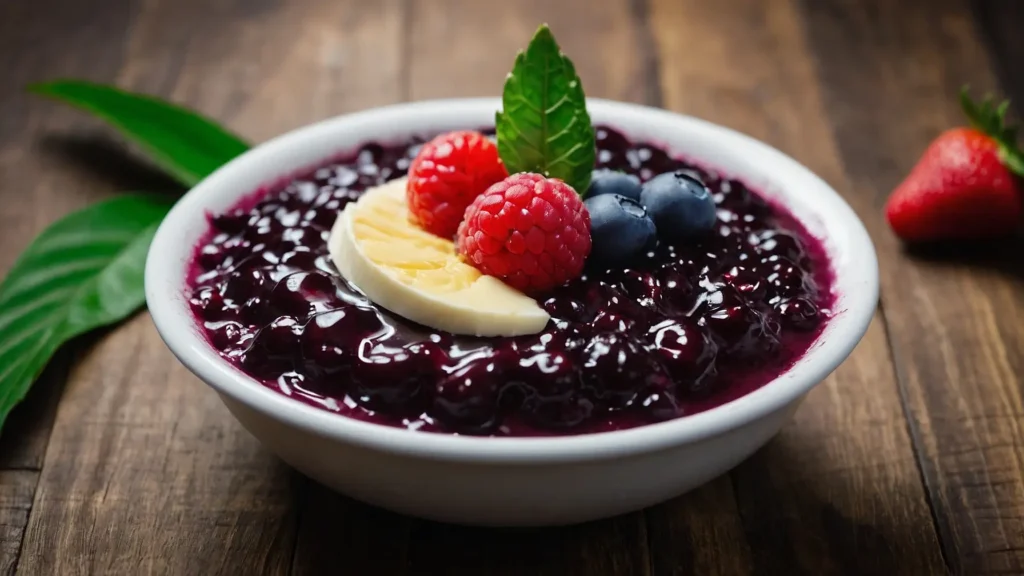Can dogs eat acai?

In the world of superfoods, acai has claimed its fame for its health benefits and its vibrant role in bowls and smoothies. Its popularity has transcended human diets, leading pet owners to wonder, “Can dogs eat acai?” This question is more than just a passing curiosity—it’s a crucial inquiry into the safety and nutritional value of acai for our canine companions.
Acai berries, native to the rainforests of South America, are small, dark purple fruits packed with antioxidants, fiber, and heart-healthy fats. They’ve been hailed for their weight loss properties, anti-aging effects, and their ability to boost immune and metabolic functions in humans. But when it comes to sharing this superfood with our dogs, it’s essential to proceed with caution and knowledge.
The canine digestive system differs significantly from ours, and what’s beneficial for humans can sometimes be harmful to dogs. Therefore, understanding the effects of acai on dogs requires a deep dive into its components, potential benefits, and risks. This guide aims to shed light on the question “Can dogs eat acai?” by exploring the nutritional aspects of acai, its effects on canine health, and safer fruit alternatives for dogs. So, let’s embark on this journey to ensure our furry friends can enjoy a healthy and balanced diet with or without the inclusion of acai berries.
Is Acai Good for Dogs?
When pondering the question, “Can dogs eat acai?” it’s tempting to assume that the health benefits humans enjoy from this superfood would translate directly to dogs. Acai berries are a powerhouse of antioxidants, which are known to combat free radicals and reduce the risk of diseases. They also contain healthy fats like omega-3, omega-6, and omega-9 fatty acids, which are beneficial for a dog’s skin and coat health.
Moreover, the fiber in acai can aid in digestion and help maintain a healthy weight in dogs by promoting a feeling of fullness. However, while these components suggest potential health benefits for dogs, the suitability of acai for canine consumption isn’t solely determined by its nutrient profile.
The antioxidants in acai, particularly anthocyanins, which give the berry its deep purple color, could support a dog’s cardiovascular health and improve cognitive functions. Yet, the question remains whether dogs can effectively process and benefit from these nutrients in the same way humans do.
It’s crucial to consider that while some aspects of acai might be beneficial, the overall impact on dogs depends on the amount consumed and the individual dog’s health and dietary needs. Moderation is key, and any introduction of new foods into a dog’s diet should be approached with caution and under veterinary guidance.
Is Acai Bad for Dogs?
The flip side of the coin presents a more cautious perspective on the query, “Can dogs eat acai?” Despite its health-promoting properties, acai contains theobromine, a compound also found in chocolate, which is toxic to dogs even in small amounts. The presence of theobromine in acai berries raises a red flag for dog owners, emphasizing the importance of understanding the potential risks associated with feeding acai to dogs.
Symptoms of theobromine poisoning in dogs include vomiting, diarrhea, increased heart rate, seizures, and in severe cases, death. The risk posed by theobromine makes it imperative for dog owners to exercise extreme caution if they choose to introduce acai into their pet’s diet.

Additionally, many acai products available on the market are mixed with other ingredients that may be harmful to dogs, such as chocolate, caffeine, xylitol (a sugar substitute), and grapes. These additives increase the risk of adverse reactions and highlight the importance of scrutinizing product labels before sharing acai-containing foods with dogs.
Given these concerns, the safest approach is to avoid feeding acai to dogs or to consult with a veterinarian for advice on incorporating it into a dog’s diet in a way that minimizes risk. The potential benefits of acai for dogs are overshadowed by the significant risks, suggesting that the cons might outweigh the pros in this case.
Are Other Berries Safe for Dogs?
In light of the concerns surrounding acai, dog owners might wonder about safer fruit alternatives. Fortunately, several berries are deemed safe and can be beneficial for dogs when fed in moderation. Blueberries, strawberries, and raspberries, for example, are excellent sources of antioxidants, fiber, and vitamins, without the risks associated with acai.
Blueberries are particularly renowned for their antioxidant properties, which can support a dog’s overall health by preventing cell damage. Strawberries offer the added benefit of teeth-whitening enzymes, while raspberries are low in sugar and high in fiber, making them suitable for dogs with weight concerns.
Introducing these berries into a dog’s diet can provide a nutritional boost and variety, enhancing their overall well-being. However, as with any dietary change, it’s essential to introduce new foods gradually and monitor for any signs of allergic reactions or digestive upset.
Final Thoughts
The inquiry “Can dogs eat acai?” opens a complex discussion about the suitability of certain human foods for dogs. While acai boasts numerous health benefits for humans, its potential risks for dogs cannot be overlooked. The presence of theobromine, along with the possibility of harmful additives in commercial acai products, suggests that caution and veterinary advice are paramount before considering acai for dogs.
Exploring safer fruit alternatives like blueberries, strawberries, and raspberries offers a way to enrich a dog’s diet without exposing them to unnecessary risks. These fruits provide similar nutritional benefits in a safer package, allowing dogs to enjoy the perks of a varied diet.
In conclusion, while the superfood status of acai is undeniable for humans, its inclusion in a dog’s diet is fraught with potential pitfalls. The guiding principle for dog owners should always be the safety and well-being of their furry companions. By choosing safer alternatives and consulting with veterinary professionals, dog owners can ensure their pets enjoy a healthy, balanced diet tailored to their specific needs.










